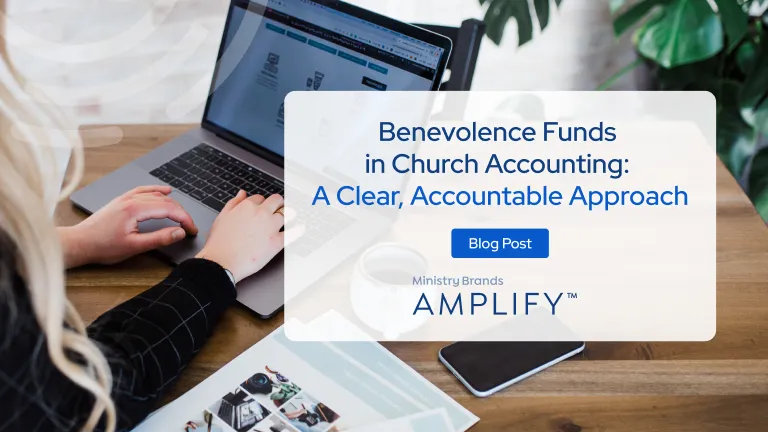When people walk through the doors of a church incrisis, they’re often carrying more than a financial burden; they’re carrying fear, uncertainty, and hope that someone will help. Benevolence funds give churches a tangible way to respond with compassion in those moments, offering short-termfinancial assistance to individuals or families facing hardship.
At the same time, church leaders are entrusted with stewarding these resources wisely. In church accounting, benevolence funds are typically treated as restricted funds; meaning donations must be used only for benevolent purposes as defined by church policy or donor intent. Managing these funds well requires clear structure, consistent documentation, and appropriate oversight. With thoughtful processes, and church accounting software designed to support restricted fund tracking,churches can honor donor intent, support those in need, and reduce financial and compliance risk while leading with both care and accountability.
What Is a Benevolence Fund?
A benevolence fund is a pool of donated resources set asideto provide temporary financial relief to people facing hardship. Its purpose is to address immediate needs rather than provide long-term financial support. Assistance is situational, responsive, and limited in scope.
Benevolence assistance is commonly used to help individuals or families meet essential living needs during periods of temporarydifficulty.
· Housing assistance, such as rent ortemporary lodging
· Utility support, including electricity, water,or heating
· Food or basic household necessities
· Transportation related to work, appointments, or emergencies
· Medical or counseling-related expenses
Why Benevolence Funds Require Special Accounting Care
Benevolence funds sit at the intersection of pastoral careand financial accountability. Churches are often required to respond quickly to urgent needs while ensuring funds are distributed consistently and responsibly.
Special accounting care is necessary because benevolencefunds are restricted, involve sensitive personal situations, and must be reported accurately. Without defined processes, churches may face misclassification of funds, incomplete records, or un intentional misuse.
How Benevolence Funds Differ from General Church Funds
General offerings support overall church operations,including staffing, facilities, and ministry expenses. Benevolence funds differ because their use is limited to specific purposes related to helping individuals or families.
Funds designated for benevolence cannot be redirected to cover operating short falls or unrelated expenses. Maintaining this distinction helps preserve donor trust and align with accepted nonprofit accounting practices.
Common Benevolence Fund Mistakes
Challenges with benevolence funds most often arise from informal handling rather than intentional misuse. Lack of structure can lead toconfusion, inconsistency, and increased risk over time.
· Insufficient documentation explaining why assistance was provided
· Unclear or inconsistent approval authority
· Mixing benevolence funds with general operating accounts
· Applying assistance criteriain consistently
Establishing Clear Benevolence Policies
Written benevolence policies provide consistency, fairness, and accountability in how assistance is administered. They help ensure decisions are based on defined criteria rather than individual discretion and remain consistent as leadership changes.
· Eligibility criteria forreceiving assistance
· Types of needs that may be covered
· Approval and oversight processes
· Documentation and recordkeeping requirements
· Limits on frequency or amount of assistance
Documentation and Recordkeeping Requirements
Accurate documentation supports transparency and accountability while respecting dignity. Records should clearly describe the purpose of assistance, the amount distributed, and the approval process.
Documentation does not require unnecessary personal detail, but it must be sufficient to support internal review, audits, and leadership reporting.
Oversight and Internal Controls
Oversight ensures benevolence funds are administered responsibly and consistently. Separating responsibilities for evaluating requests, approving assistance, and disbursing funds reduces financial risk.
Regular reporting to church leadership provides visibility into benevolence activity while maintaining appropriate confidentiality.
Frequently Asked Questions
1. Are benevolence funds considered restricted funds?
Yes. Benevolence funds are restricted and must be used only for purposes defined by church policy or donor intent.
2. Can benevolence funds be used for operating expenses?
No. Benevolence funds should not be used for general operations, evenduring periods of financial pressure.
3. How detailed should benevolence documentation be?
Documentation should explain the purpose, approval, and amount of assistance without unnecessary personal details.
4. Who should approve benevolence assistance?
Approval authority should be clearly defined in written policy and separated from fund disbursement when possible.
Next Steps
Benevolence ministry brings compassion and stewardship together. When managed well, benevolence funds help churches respond to real needs while maintaining clarity, consistency, and trust. Clear policies, proper documentation, and thoughtful oversight don’t restrict generosity; they protect it.
Church leaders should assess whether their financial systems adequately support restricted fund management. Church accounting software built specifically for ministry simplifies tracking, documentation, and reporting. Ministry Brands’ Accounting can help churches manage benevolence funds with confidence, maintain compliance, and strengthen financial transparency, freeing leaders to focus on people, not processes.

